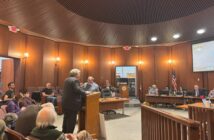
Megan Brubaker
“Ten minutes, 30 seconds,” my gym teacher shouted as I completed my first mile-run fitness test in middle school.
Not bad, I thought to myself. Five minutes earlier, I had been huffing and puffing by lap two while my athletic classmates passed me like Bowser laps Baby Peach in Mario Kart.
Even though I walked off the track to a crowd of my peers that had finished minutes before me, we all left the track as equals: a bunch of sweaty middle schoolers who had tried their best and a gym teacher who prayed that we all brought body spray and deodorant. We smelled, but we worked hard and earned our times, so we left knowing that we had done the best that we could — fairly.
I wish that the mile-run test was a proper analogy for the game of life, but the truth is that the track to success isn’t quite as objective and fair. Whether you view life as a marathon or sprint, it is no secret that not everyone is lucky enough to begin at the same starting point or lap, let alone the same track.
With this in mind, I can’t help but wonder what compels the extremely wealthy, who are lucky enough to start on the fast track to success, to disregard their privilege and go even further as to cheat, lapping those who have spent their entire lives just finding their way to the track.
On March 12, news about the college admissions scandal, Operation Varsity Blues, broke. Lori Loughlin, well-known actress who played Aunt Becky on “Full House,” and daughter Olivia Jade, successful influencer on Youtube and Instagram, are at the forefront of the scandal.
In summary, Loughlin and husband, Mossimo Giannulli, founder of the multi-billion dollar clothing company, Mossimo, paid $500,000 for their daughters, Olivia and Bella, to pose as rowing recruits to gain admission into the University of Southern California: a selective institution, listed number 36 on Niche’s list of hardest colleges to get into.
While the family’s fame has backfired to make them the target of endless criticism, charges were made against 46 other parents as well. Loughlin and Jade have been hit by extreme backlash, including Hallmark cutting relations with Loughlin and sponsorships disassociating themselves from Jade’s brand. The foundation of the family’s prestige seems to be crumbling in front of them, and the world is watching in demand.
The internet has taken this case by storm: whether spectators take a comedic approach or tell their own testimonials regarding the effect of privilege on their lives, the scandal has sparked important conversations regarding the abuse of privilege and its cyclical effect on equal access to higher education.
But with such luxurious figures in the spotlight, I worry that we will view this scandal as an extreme distortion of normality: we will separate ourselves from these extremes, forgetting that the foundation of the issue is the normalized impact that privilege has in our society.
As this scandal becomes another news story of the past, this is a conversation that is critical for the present and future of our education system.
According to the U.S. Department of Education, college graduates with a bachelor’s degree earn 66 percent more than those with only a high school diploma. Concurrently, over the past three years, tuition at four-year colleges has doubled, and only 14 percent of students that come from low-income families are expected to obtain a bachelor’s degree.
But money is not the only systemic barrier to a higher education.
A University of Chicago study states that “poor academic preparation that undermines minority and low-income students’ access and performance in college, students difficulties in navigating the college enrollment process, and the declining real value of financial aid combined with rising college costs” are all factors in the cyclical privilege barrier.
And even when low-income and minority students defy barriers to higher education, top universities are statistically more attainable for a student of wealth. Fourteen percent of the University of Southern California’s student body is made up of the top one percent, whereas only 4.9 percent are low-income students. And while universities have made progress through affirmative action policies, Michael Dannenberg of Education Reform Now found that “more white students are admitted to top 10 universities under an alumni preference bonus than the total number of black and Latinx students admitted under affirmative action policies.”
We cannot expect a change without acknowledging our own privileges, or lack thereof, that have either gotten us to where we are today, or done the opposite.
I am privileged to have grown up in a family and attended a high school that supported me as I pursued a higher education. Growing up with mentors who pushed me to work hard in school, I could create a strong foundation for my future. It is a privilege to say that my grades were my biggest responsibility in high school, not what my next meal would be or how my family would pay the next bill.
While I worked hard to get to where I am today, so did many people before me, and it is important that I recognize my head start. Late nights studying in high school, while stressful, were a privilege. I was fortunate to have incentives, support and time to invest in my future, but this is not every student’s reality.
Maslow’s Hierarchy of Needs shows how without meeting basic needs — food and water, rest and supportive relationships — a person is unable to work toward personal accomplishments and achieve their full potential. In other words, some of the fastest runners in the race may still finish last if they do not receive the support to make it to the track.
It is unfortunately unrealistic to expect all people to be born into equal privileges in the near future, but it is realistic, and necessary, to recognize our own head starts, as well as acknowledge the accomplishments of those who have come from much less, miles behind.
The outrage that has resulted from the cheating scandal is a step forward in the direction of progress, but with one step forward, we must take a step back and acknowledge the privileges that have led us to our own successes. Future progress is not a marathon or a sprint. Instead, it is a relay.
As we look back at those behind us and ahead to those in front of us, I hope that we will continue the conversation and realize that we are on the same team.





Comment policy
Comments posted to The Brown and White website are reviewed by a moderator before being approved. Incendiary speech or harassing language, including comments targeted at individuals, may be deemed unacceptable and not published. Spam and other soliciting will also be declined.
The Brown and White also reserves the right to not publish entirely anonymous comments.